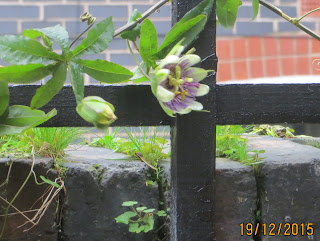With thanks to Stanley Kaye (The Poppy Man)* for finding this poet for us and for sending
me the photograph he took of the Memorial to Francis in the British National Memorial Arboretum
 |
| Portrait - artist unknown |
Francis Brett Young was born in Halesowen, Dudley, Worcestershire, UK. His parents were Thomas Brett Young, a medical doctor, and his wife, Annie Elizabeth Young, nee Jackson, who were married in Leicester in 1883. Francis’s mother was also from a medical family.
Initially educated at a private preparatory school in Sutton Coldfield, Francis went on to Epsom College, a school for the sons of doctors. He then went to train as a doctor at the University of Birmingham. While there, Francis met his future wife – Jessie Hankinson - who was training at Anstey College of Physical Education.
Francis began his medical career on the steamship SS Kintuck, on a voyage to the Far East, before taking on a practice in Devonshire in 1907. Francis and Jessie were married in Axbridge, Somerset, UK in 1908. His wife was a singer and he accompanied her as well as setting poems to music for her.
During the First World War, Francis served in the East African Campaign in German East Africa in the Royal Army Medical Corps as a medical officer with the 2nd Rhodesia Regiment. He was invalided out in 1918 and no longer able to practise medicine. Francis wrote about his WW1 experiences in his book entitled “Marching on Tanga” which was heavily censored before publication in 1917. The book is available to read as a free download on Archive:
https://archive.org/stream/dli.ernet.16384/16384-Marching%20On%20Tanga_djvu.txt
THE GIFT
Marching on Tanga, marching the parch'd plain
Of wavering spear-grass past Pangani River,
England came to me - me who had always ta'en
But never given before -- England, the giver,
In a vision of three poplar-trees that shiver
On still evenings of summer, after rain,
By Slapton Ley, where reed-beds start and quiver
When scarce a ripple moves the upland grain.
Then I thanked God that now I had suffered pain,
And, as the parch'd plain, thirst, and lain awake
Shivering all night through till cold daybreak:
In that I count these sufferings my gain
And her acknowledgment. Nay, more, would fain
Suffer as many more for her sweet sake.
AFTER ACTION
All through that day of battle the broken sound
Of shattering Maxim fire made mad the wood;
So that the low trees shuddered where they stood,
And echoes bellowed in the bush around:
But when, at last the light of day was drowned,
That madness ceased.... Ah, God, but it was good!
There, in the reek of iodine and blood,
I flung me down upon the thorny ground.
So quiet was it, I might well have been lying
In a room I love, where the ivy cluster shakes
Its dew upon the lattice panes at even:
Where rusty ivory scatters from the dying
Jessamine blossom, and the musk-rose breaks
Her dusky bloom beneath a summer heaven.
From “Poems 1916 – 1918” by Francis Brett Young, (W. Collins Sons & Co, Ltd., London, 1919), which is available to read as a free download on Project Gutenberg. https://www.gutenberg.org/files/40344/40344-h/40344-h.html
Francis Brett Young’s WW1 poetry collections were:
“Five Degrees South (and other poems)”, (Martin Secker, 1917)
“The Island (poems)”, (Heinemann, London, 1944)
“Poems, 1916-1918” (Collins, 1919)
And he had poems published in nine WW1 Anthologies.
Sources: FreeBMD, Find my Past,
Catherine W. Reilly, “English Poetry of the First World War: A Bibliography” (St. Martin’s Press, New York, 1978) p. 345
https://allpoetry.com/Francis-Brett-Young
https://www.gutenberg.org/files/40344/40344-h/40344-h.html
https://www.npg.org.uk/collections/search/portrait/mw221799/Francis-Brett-Young
https://www.thenma.org.uk/
 |
| Photo by Stanley Kaye |
An arboretum (plural: arboreta) is a botanical collection composed exclusively of trees of a wide variety of different species. The British National Memorial Arboretum is situated in the centre of England on Croxall Road, Alrewas in Staffordshire. It is easy to reach and is close to all the Midlands motorways.
* https://www.facebook.com/groups/rememberingworldwarone
The 4 Flowers of Remembrance:
 |
| Flowers of Remembrance - Forget me Not Poppy, Daisy and Cornflower |
The Cornflower (Bleuet) is the remembrance flower of France,
The Daisy (Madeliefje/Marguerite) of Belgium,
The Red Flanders Poppy (Coquelicot) is universal but the idea of using the poppy as a symbol of remembrance comes from American Poet Moina Belle Michael’s vow always to wear a red poppy in remembrance+ and
The Forget-me-Not of Germany (Vergiss-mein-nicht)
Peter Van den Broeck tells us that The Forget-me-not is also the WW1 remembrance flower of the Armenian genocide ..... and for Newfoundland.
.jpg)








